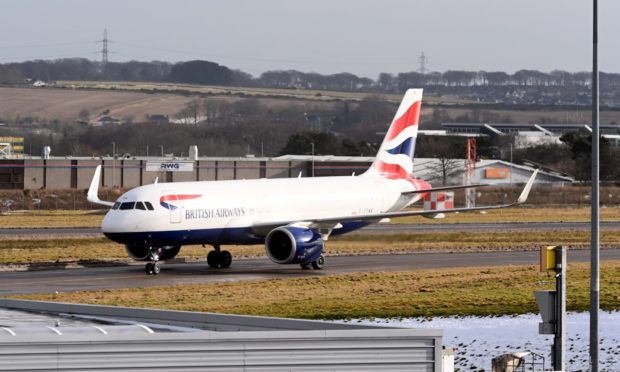The owner of British Airways (BA) has racked up at least another £1 billion in losses since the mammoth £6.8bn pre-tax trading deficit suffered during 2020.
International Airlines Group (IAG), the Anglo-Spanish multinational behind airlines including BA, Aer Lingus and Iberia, today (May 7) posted first quarter pre-tax losses of £1.06bn as the industry globally continues to operate a severely reduced schedule.
Travel restrictions that have been in place since the start of the Covid-19 pandemic have sent passenger numbers plummeting and left many of the world’s airlines struggling to survive.
We’re ready to fly.”
Luis Gallego, IAG chief executive
IAG said passenger capacity during the first three months of this year was less than one-fifth (19.6%) of 2019 levels, and continued to be adversely affected by the pandemic, together with government restrictions and quarantine requirements.
Passenger capacity in the current quarter is running at around 25% of 2019 levels, but schedules “remain uncertain and subject to review”.
By contrast, cargo-only flights jumped to 1,306 in Q1 – from 969 in the final three months of 2020 – as IAG’s airlines tried to make the most of other revenue sources.
BA’s overall capacity was adversely impacted by the UK-wide lockdown imposed in January and the associated international travel ban.
Long-haul routes operated primarily for cargo purposes during Q1, with a number of daily flights continuing to US cities including New York, Washington and Los Angeles.
Shorthaul operations were severely impacted by travel restrictions, but regular operations connected the main cities and saw “steady business travel demand”.
Total revenue slumped by nearly 80% to £840.6m in the first quarter of 2021, from £3.99bn a year ago.
Pension deferrals
But IAG insisted it was financially robust, highlighting £9.1bn of “liquidity” at the end of the quarter, thanks to financing initiatives, cost-cutting and a deferral of BA pension contributions totalling £450 million between October 2020 and September 2021.
Chief executive Luis Gallego said: “We’re taking all necessary actions to ensure the financial health of our business for the long-term, including last year’s successful 2.7 billion euros (£2.3bn) capital increase, and remain focused on reducing our cost base and increasing efficiencies.
“We’re doing everything in our power to emerge in a stronger competitive position.
“We’re absolutely confident that a safe re-start to travel can happen as shown by the scientific data. We’re ready to fly.”
Mr Gallego said UK travel corridors would help the industry revive, adding: “We consider now is the time to start travelling again.
“The government needs to be a bit ambitious in getting global travel back on track. They need to recognise that people who are vaccinated or have been tested can travel without restrictions.”
Other measures proposed by IAG include “affordable, simple and proportionate testing to replace quarantine and costly, multi-layered testing”.
The group also called for “well-staffed borders using contactless technology, including e-gates to ensure a safe, smooth flow of people and frictionless travel”.
In addition, it wants to see the introduction of “digital passes for testing and vaccination documentation to facilitate international travel”.
‘There’s a high level of pent-up demand.”
“These measures will enable a safe re-opening of our skies,” Mr Gallego said, adding: “Travel underpins a global industry that supports 13 million jobs in Europe alone.
“There’s a high level of pent-up demand, and aviation will play a critical role in reconnecting people and getting economies back up and running again.”
London-headquartered IAG expects it will take until at least 2023 for passenger demand to reach the levels of 2019.
The group is “restructuring” costs to adjust to significantly lower levels of demand, while further financial manoeuvering in the first quarter included an additional £3.1bn of non-aircraft debt and a new £1.5bn revolving credit facility.
But IAG warned: “The group cannot provide certainty that it will be able to secure additional funding, if required, in the event that a more severe downside scenario than those it has considered were to occur.”


